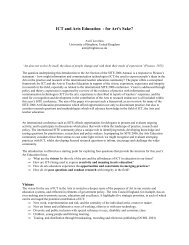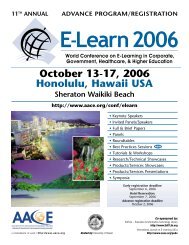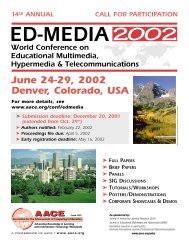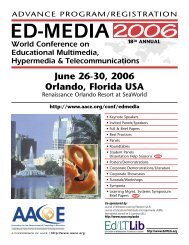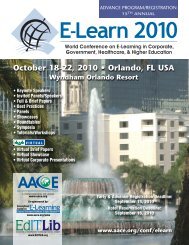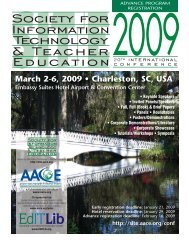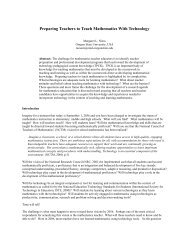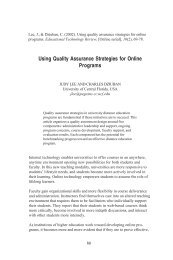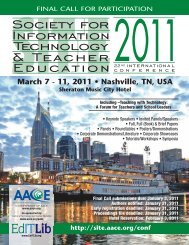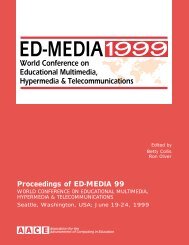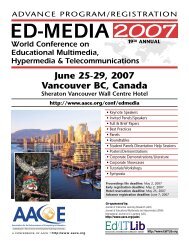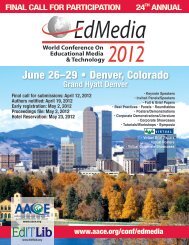ED-MEDIA 1999 Proceedings Book - Association for the ...
ED-MEDIA 1999 Proceedings Book - Association for the ...
ED-MEDIA 1999 Proceedings Book - Association for the ...
Create successful ePaper yourself
Turn your PDF publications into a flip-book with our unique Google optimized e-Paper software.
course materials make commitments and predictions try out ideas, and get response to those ideas—all of which may be<br />
fostered through <strong>the</strong> use of technology—have <strong>the</strong> greatest chance of overall retention and integration of learning” (Berger,<br />
1998, p. 20). “Using computer, An instructor has been able to go beyond <strong>the</strong> traditional linear regression curriculum to<br />
cover cluster analysis and <strong>the</strong> rudiments of factor analysis.” Get rid of linear learning mode but take up to complex and selfpaced<br />
learning.<br />
Learning and teaching with technology encourages active inquiry, making learning complex but making possible learning<br />
events taking place at anytime, anyplace. Students construct knowledge at pace needed by individual student while<br />
accelerating learning capabilities in negotiation and team ef<strong>for</strong>ts. Participating in on-line discussion asynchronously as well<br />
synchronously, students are compelled to think critically and learn from o<strong>the</strong>rs, which creates contextual learning<br />
experiences and making learners “go beyond traditional memorization of facts and fundamentals”. This learning approach<br />
broadens <strong>the</strong> students’ concepts but also enhance <strong>the</strong>ir acquisition of learning skills, such as electronic learning skills that<br />
may be used in <strong>the</strong>ir future courses or later personal and professional growth (Bazillion & Braun, 1998, p. 37).<br />
Reference<br />
Bazillion, R. & Braun, C. (1998). Teaching on <strong>the</strong> web and in <strong>the</strong> studio classroom. Syllabus, Vol. 11(8), 37-39.<br />
Berger, C. (1998). Ann Jackson and <strong>the</strong> four myths of integrating technology into teaching. Syllabus, Vol. 11(7), 18-20.<br />
Kelly, J. T., & Leckbee, R. (1998). Reality check: What do we really know about technology, and how do we know about<br />
it Syllabus, Vol. 12(1), 24-26.<br />
Graves, W. (1998). Learning as an expedition, technology as a unifying tool. Syllabus,Vol. 12(1), 20-22.<br />
Grossman, S. (<strong>1999</strong>). Introduction Speech in Democratic National Committee Meeting. Democratic National Committee<br />
Meeting, Mar. 20, <strong>1999</strong>.<br />
McCandless, G. (1998). Creating a level playing field <strong>for</strong> campus computing: Universal access. Syllabus, Vol. 11(6), 12-14<br />
and 29.<br />
Raschke, C. (1998). Digital culture, <strong>the</strong> third knowledge revolution, and <strong>the</strong> coming of <strong>the</strong> hyperuniversity. Syllabus, Vol.<br />
11(7), 14-16.



